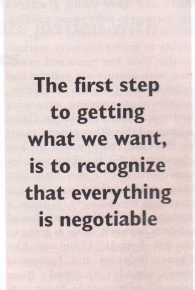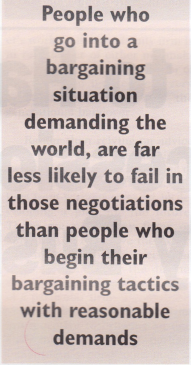It’s all Negotiable
Bargaining enters our lives every day. We negotiate for virtually everything from buying vegetables at the market, to getting a payrise, to legal disputes, to major business deals, to international diplomacy. And at the end of day, we all want to get our own way.
Experts in the discipline of negotiation say the first step to getting what we want, is to recognize that everything is negotiable. Imagine how many lawsuits are settled out of court, for instance, and how many international crises are averted through diplomatic wheeling and dealing.

The Good Negotiator
So what makes an effective negotiator? Some people are lucky enough to be born with the personality characteristics necessary to quite effortlessly get exactly what they want out of even the most difficult situation. They are intuitively good at persuasion. They possess planning skills, verbal grace, patience, self-confidence and calm. And they provoke feelings of trust and honesty in their counterparts. But if your natural tendency is to stamp your feet and resort to bullying tactics, do not despair. Once a hot-head, not always a hot-head. Negotiating skills can be learned.
Lim Lei Theng, Lecturer at the National University of Singapore, says it is really just a matter of getting into the mindset that negotiation can be taught and that your skills can be improved.
Negotiation Strategy
Research in the field of negotiation indicates two critical elements of a successful negotiation strategy: your aspiration level and your ability to take your time and patiently sit out what might end up being a very long bargaining process.
People who go into a bargaining situation demanding the world, are far less likely to fail in those negotiations than people who be- gin their bargaining tactics with reasonable demands. If you aim high, you leave room to make small concessions to your counter- part along the way.
Research also indicates that the quicker the negotiation is concluded, the more extreme the outcome. This means there is less room for negotiating a deal agreeable to both parties. The deal could be vastly in favour of either one or the other party and you could be on the losing end.

Do Your Homework
Before entering into any negotiation it is important to do your homework. You must think ahead to determine what you hope to achieve from the negotiations, what you hope the outcome will be. You must know your bottom line, what concessions you are pre- pared to make, so you do not end up concluding the negotiations with a feeling of a major loss of face.
You should think about your goals in three levels. One is the minimum that you would be happy with. The second is something that you would be a little more happy with, it is your satisfaction level, it’s what you would realistically be able to achieve if the other side were co-operative and if you could come up with a win-win solution. And the third is your ultimate aspiration level, the best deal you could ever get if you sat down and dreamt about it, says Lim.
Opponent Or Counterpart
You must also do your homework on your negotiating opponent. Your priority, of course, should be to protect your own interests. But, never go into negotiations with the view that you are dealing with an enemy. Your opponent is not an opponent at all, but rather a counterpart in an exercise which, if conducted properly, should end up being beneficial to both parties.
Go in expecting a challenge. Never go into a negotiation expecting an easy ride, even if you happen to be the salesman for one of the best-known products on the market or have enjoyed vast success in negotiation in the past. You must expect that you will win, but you must also expect that your counterpart will drive a hard bargain. Always stay on your toes. You may be dealing with someone as determined as yourself and the person will be bound to have his or her own agenda and goals. It is a case of give and take. Also try and track down someone who has negotiated with the counterpart in the past. Deter- mine what kind of a negotiating strategy your counterpart is likely to adopt.
You should try to put yourself in the shoes of the other person and understand what your counterpart aims to get out of the deal. Even an apparently simple transaction such as selling a car could have a hidden agenda. For in- stance, the seller may not be interested in money alone. The seller may also be keen that the car, which holds so much sentimental value, goes to the right owner and not to someone likely to immediately repaint the car.
It is crucial to ask revealing questions and pay attention to your counterpart’s answers and actions. Make sure you have a questioning plan. And listening is just as much an integral part of good negotiating skills. If you are not a good listener you will miss important clues. And always try to be an objective listener. Write everything down. Do not trust your memory. And never lose your temper.
The First Is Never The Last
Never go into negotiations with the view that your first meeting is likely to be your last meeting. The first meeting should be the information gathering meeting. It should be the opportunity for you to assess whether your goals are realistic and if you discover they are not, you should aim to revise your goals in preparation for the next meeting.
Win/Win Versus Lose/Lose
Experts have identified five categories of outcome for any negotiation: lose/lose, lose/win, win/lose, win/win or stalemate. In a lose/lose outcome, neither party achieves what they want. In a lose/win or win/lose outcome, only one party is the winner. And being the loser will hurt. The loser may well not wish to negotiate with his or her counterpart again. The desired outcome of any negotiation is a win/win situation. As a master negotiator, you have a responsibility to help your counterpart achieve the best deal too. You need to consider your counterpart’s pride and what he or she needs to achieve from the deal. It is likely that you will have to deal with the counter- part again in the future.

How To Achieve A Win/Win Situation
The key to achieving a win/win outcome is flexibility. One of the most inflexible tools of negotiation is money. Remember there are other ways of concluding a deal without insisting on a price. There are all kinds of fringe elements which could be taken into consideration. For example, if your company is not in a financial position to give you the payrise you are looking for, you may want to consider accepting a company car in- stead or a pension plan or increased holiday. If you are negotiating on a second-hand car, you may want to consider accepting a stereo unit and a full tank of petrol rather than a reduced price.
Time To Walk Away
There are times when there will be no point continuing negotiations. It may be blatantly clear that neither party will ever achieve what they are looking for. Part of a successful negotiation strategy also means knowing when to stop banging your head against a brick wall and when to cut your losses and walk away.
Knowing when to walk away involves knowing what your Batna is, says Lim. Batna is an acronym for Best Alternative to a Negotiated Agreement.
Also bear in mind that this tactic may just achieve what you are looking for, since in any relationship, the person showing the least commitment often wields the most power.


